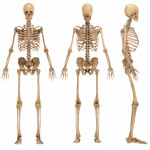A one-time dose of zoledronate (Reclast) increased bone health for up to one year in HIV-positive patients with bone mineral deficiency, according to a study published in the January 2 issue of AIDS.
Bone mineral loss—known as osteopenia when it is mild to moderate and osteoporosis when it is more severe—is a disorder that most commonly strikes women after they’ve gone through menopause, people with thyroid problems and people who’ve taken corticosteroids for many years. There have been increasing reports in recent years, however, of younger HIV-positive women and men with bone mineral loss. Unfortunately, few studies have looked at osteopenia and osteoporosis treatments in people living with HIV.
To explore the potential of zoledronate, which has been approved as a once yearly injection for women with osteopenia and osteoporosis, Jeannie Huang, MD, MPH, from the University of California in San Diego, and her colleagues first screened 143 HIV-positive patients from their clinic. Thirty patients met the study qualification of having significantly reduced bone density at either the lower spine or hip and were randomized to receive either a 5 milligram injection of zoledronate or a placebo. The average age of the participants was 48, and 27 were men.
Twelve months after the one-time injection, Dr. Huang’s team found that bone density increased significantly in both the lower spine and hip in people who received zoledronate. Bone density increased only slightly at the lower spine and actually decreased in the hip in people who received the placebo. All the participants had increased their calcium intake during the study period, but to an equal degree, and this did not affect the study’s outcome.
One patient on zoledronate did experience uveitis—an inflammation of the eye—a known side effect of the drug. Otherwise the drug was generally well tolerated. The authors acknowledge that the long-term safety of zoledronate, given over several years, will need to be studied, but they conclude that it is a good treatment candidate for people with HIV and osteopenia or osteoporosis.
Advertisement
Advertisement
Advertisement






Comments
Comments